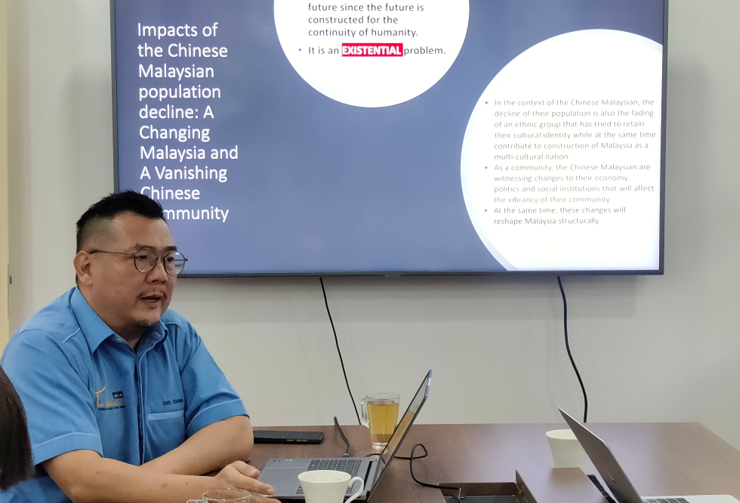
On September 23, 2024, the 29th lecture in the “Adventus Amicorum” series was held by the Institute of Area Studies, Peking University (PKUIAS). The seminar invited Associate Professor Chin Yee Mun, chairperson of the Tun Tan Cheng Lock Centre for Social and Policy Studies (TCLC) at Tunku Abdul Rahman University (UTAR), Malaysia, to deliver a talk titled “Discussing the Declining Malaysian Chinese Population: The Endogenous Factors.” The seminar was moderated by Kong Tao, director of the Research Department at the China Social Science Survey Center of Peking University.
Professor Chin began by presenting the current state of the global Chinese population. He noted that the natural decline of the Chinese population was not only particularly evident in Malaysian Chinese communities but had also become a challenge faced by Chinese communities worldwide. The rate of decline among the Malaysian Chinese population is faster compared to other ethnic groups, a phenomenon that could have profound implications for both the future development of the Chinese community and the country as a whole. While economic pressures are often cited as the main reason for the weakening desire to have children, Professor Chin argued that this view requires deeper reflection.
He then analyzed the various factors behind the decreasing fertility rate among Malaysian Chinese and the potential short- and long-term impacts on Malaysia. Chin suggested that the capitalist economic model, the reinterpretation of traditional values, and changes in domestic policies had led many Malaysian Chinese to adopt the belief that having fewer or no children was preferable. This shift, he argued, could have significant consequences for Malaysia’s national economic productivity and Chinese political participation.
During the discussion session, the attending students and faculty engaged in in-depth exchanges with the speaker on the lecture topic. Doctoral students and visiting scholars from PKUIAS, the Institute of Population Research, and the Department of Chinese Language and Literature at Peking University compared the population structures, fertility policies and education systems of China and Malaysia. They also discussed how policy support, social services, and cultural education could be leveraged to increase the fertility rates among Chinese communities and how global Chinese communities could work together to address this challenge.
In Kong Tao’s concluding remarks, she expressed her hopes for deepening academic exchanges and building academic consensus between intellectuals from China and Malaysia.


